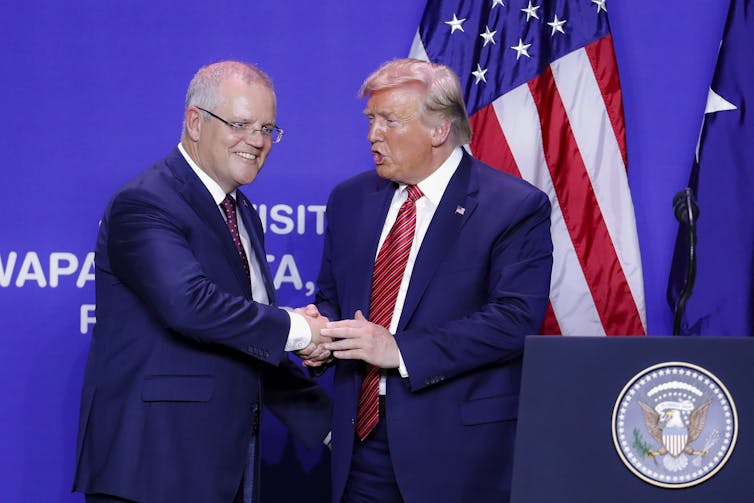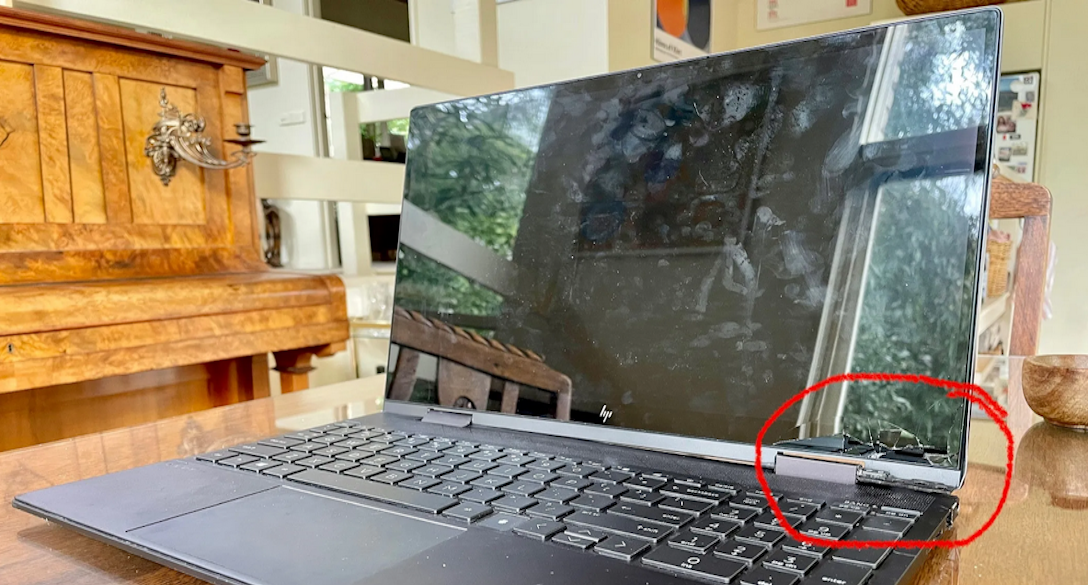Can the election bring a fresh start in our fractured relationship with China?
- Written by James Laurenceson, Director and Professor, Australia-China Relations Institute (ACRI), University of Technology Sydney

This is the first piece in a foreign policy election series looking at how Australia’s relations with the world have changed under the Morrison government.
Official relations between Australia and China are worse now than at the beginning of Prime Minister Scott Morrison’s term. This isn’t opinion – it’s a statement of fact.
These days, it’s easy to forget that just a month after winning the 2019 election, Morrison met[1] with China’s president, Xi Jinping, on the sidelines of a G20 gathering in Japan.
In November of that year, he also sat[2] down with the Chinese premier, Li Keqiang, while the two were in Thailand for the East Asia Summit.
His foreign minister, Marise Payne, meanwhile, met her Chinese counterpart, Wang Yi, in August 2019[3] - and again the following month[4].
This high-level political dialogue, albeit not in the form of official bilateral visits, came at a time when political relations were already strained after Canberra had taken a strong stand[5] against Beijing’s actions in the South China Sea and banned[6] Chinese technology companies from Australia’s 5G rollout, among other actions.
Two factors made this delicate balance possible from Beijing’s perspective.
First, early in his term, Morrison was deliberate in framing relations with China as a partnership. Despite the disagreements, he said he was[7] “very committed to ensure [these] don’t overtake […] the rest of the relationship”.
Second, Morrison was careful to put some distance[8] between his own government’s position on China and that of the Trump administration[9] in the US.
Standing alongside Morrison following a meeting in the Oval Office in September 2019, Trump announced[10] that “Scott has very strong opinions on China” and then challenged him to express those “right now”.
Morrison’s response? “We have a comprehensive strategic partnership with China. We work well with China […] we have a great relationship with China”. The contrast with Trump, who went on to describe China as “a threat to the world”, was dramatic.
Four days later, China’s foreign ministry released a statement[11] saying it had
noted Australia’s positive statements recently, particularly by Australian PM Scott Morrison who said China was a partner not a threat to Australia.
How relations soon began to sour
But in early 2020, this balance was lost.
The trigger came in April when, freshly returned from a visit to the US, Home Affairs Minister Peter Dutton delivered remarks that solidified[12] Beijing’s assessment that Canberra was coordinating with Washington to attack China over the COVID-19 pandemic. In quick succession, Payne and Morrison made other comments that reinforced[13] this perception.
Read more: China-Australia relations hit new low in spat over handling of coronavirus[14]
Then, in late 2020, The Wall Street Journal reported[15] that Australian diplomats far afield in Europe had been “connecting China critics in smaller nations with counterparts elsewhere”, adding these efforts “buttressed similar ones by Washington”.
Beijing’s response was to freeze dialogue with the Morrison government and begin a campaign of economic coercion targeting[16] Australian exports. The latter, in particular, strengthened the case being made against Beijing by China hawks in Canberra and also contributed to a sharp negative turn in Australian public opinion[17].
The rest of the year was characterised by increasingly harsh rhetoric, particularly from Beijing, and a series[18] of actions and counter-actions. Black and white adversarial positions[19] were adopted[20] in both capitals.
And then hit rock bottom
By 2021, Morrison had more or less stopped describing China as a partner. In February, he declared[21]
China’s outlook and the nature of China’s external engagement … has changed since our comprehensive strategic partnership was formed.
Along with Dutton (now defence minister), the prime minister began to overwhelmingly cast China as a threat.
Read more: China retaliates: suspending its Strategic Economic Dialogue with Australia is symbolic, but still a big deal[22]
Further, with an eye to the polls, the Coalition government sought to turn the “China threat” into an election wedge from late 2021.
Morrison accused[23] the opposition leader, Anthony Albanese, of having “backed in the Chinese government” in November. And talk[24] of Labor’s “appeasement” of China then coloured political rhetoric over January and February this year.
How could the election change things?
Yet, as our new qualitative survey[25] at the Australia-China Relations Institute shows, there is no material difference between the major parties’ China policies. Instead, the distinctions between the Coalition and Labor are confined to how such policies might be best carried out.
The opposition has indicated[26] it would place greater emphasis on diplomatic tone and conduct, ensuring, for example, the Department of Foreign Affairs and Trade plays a bigger role.
Asked what Labor’s “plan on China” is, Shadow Foreign Minister Penny Wong said[27] in February it would prioritise improving Australia’s military and diplomatic capabilities, as well as its economic resilience. Labor has also refrained from depicting the world in stark ideological terms.
Morrison previously rejected[28] viewing the rise of China as “some great ideological struggle between two world-views”, saying this could lead to a “very dangerous end”.
However, he began to embrace[29] this binary in June 2021. This crescendoed with a warning[30] last month that a new “arc of autocracy” was emerging to “challenge and reset the world order in their own image.”
China’s behaviour broadly is now very different to what it was a decade ago, meaning whichever party takes office following the May election will face numerous challenges in trying to manage the relationship and ensure it does not worsen.
Recent developments such as the growing closeness between China and Russia[31] and Russia’s invasion of Ukraine bring other troubling dimensions.
But the Morrison government’s 2019 formula, and the results this delivered, suggest what still might remain possible.
Labor’s mooted approach leans in this direction. It is also more closely aligned with the approach taken by other countries in the region, which despite having their own, sometimes acute, challenges with Beijing, are still able to advocate their interests with China’s leaders and benefit from trade that flows freely.
Read more: Elections are rarely decided by security and defence issues, but China could make 2022 different[32]
References
- ^ met (www.pm.gov.au)
- ^ sat (www.abc.net.au)
- ^ August 2019 (www.mfa.gov.cn)
- ^ month (www.fmprc.gov.cn)
- ^ had taken a strong stand (www.smh.com.au)
- ^ banned (www.bbc.com)
- ^ he said he was (www.pm.gov.au)
- ^ distance (www.australiachinarelations.org)
- ^ that of the Trump administration (www.vox.com)
- ^ announced (www.pm.gov.au)
- ^ statement (www.afr.com)
- ^ solidified (www.mfa.gov.cn)
- ^ reinforced (www.australiachinarelations.org)
- ^ China-Australia relations hit new low in spat over handling of coronavirus (theconversation.com)
- ^ reported (www.wsj.com)
- ^ targeting (theconversation.com)
- ^ public opinion (www.australiachinarelations.org)
- ^ series (theconversation.com)
- ^ positions (www.pm.gov.au)
- ^ adopted (www.mfa.gov.cn)
- ^ declared (www.pm.gov.au)
- ^ China retaliates: suspending its Strategic Economic Dialogue with Australia is symbolic, but still a big deal (theconversation.com)
- ^ accused (www.pm.gov.au)
- ^ talk (www.skynews.com.au)
- ^ qualitative survey (www.australiachinarelations.org)
- ^ indicated (www.pennywong.com.au)
- ^ said (pennywong.com.au)
- ^ rejected (www.youtube.com)
- ^ embrace (www.pm.gov.au)
- ^ warning (www.pm.gov.au)
- ^ growing closeness between China and Russia (en.kremlin.ru)
- ^ Elections are rarely decided by security and defence issues, but China could make 2022 different (theconversation.com)













